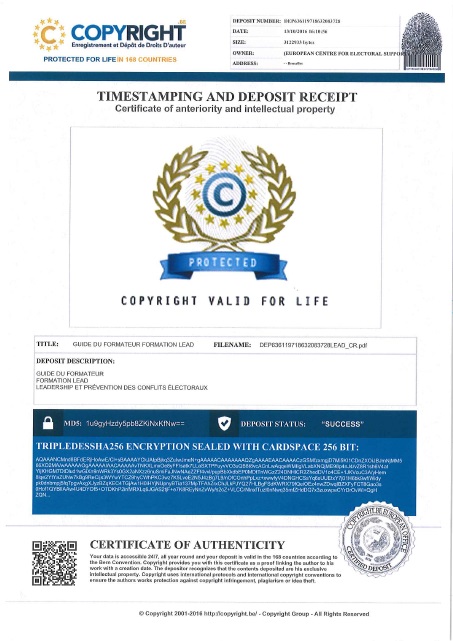Leadership and Conflict Management Skills for Electoral Stakeholders

The innovative Leadership and Conflict Management Skills for Electoral Stakeholders (LEAD) training is a result of the long-standing partnership between ECES and the Center for Creative Leadership - Leadership Beyond Boundaries (CCL-LBB), which aims to develop capacities at the cross-roads between leadership and conflict management.
The overall objective of the five day LEAD workshop is to look into ways in which representatives of electoral stakeholders (namely representatives of Electoral Management Bodies - EMBs), Non-Governmental Organisations, Political Parties, Academics and Practitioners can improve their leadership skills and take on means for preventing and/or mitigating the escalation of electoral violence and conflict throughout the respective electoral cycle.
LEAD is a flexible learning tool that is customised according to the specific context and target group. It provides participants with the resources and skills needed to replicate the training, guaranteeing its sustainability.
The LEAD training course is delivered as Open Enrollment workshop, in the framework of ECES projects or as stand-alone events to the benefit of specific electoral stakeholders.
LEAD uses education techniques with an interaction-based approach. Indeed, instead of relying on conventional teaching methods such as lecturing, LEAD focuses on practical problem solving. The training uses cases that electoral stakeholders actually face, promoting experience sharing among the participants. The purpose of this methodology is to provide content of direct relevance to participants' concerns as well as to deliver this content in a creative manner. By promoting a practical and interactive learning experience, LEAD encourages participants to think outside the box in order to bring creative and innovative ideas to the table.
Three main participatory elements are featured in this training programme:
- Assessment: assessment tools are developed to help facilitate self-reflection in participants to examine identity and management skills as well as key challenges and to establish individual development goals;
- Challenge: experimental team-based activities are carried out and provide a safe place for participants to interact and apply management skills developed during the course of the training;
- Support: a supportive learning environment focused on peer input is established within which participants share their challenges and aspirations, receive feedback on their strengths and improve effectiveness.
The film “An African Election“ produced and directed by Jarreth Merz is shown during the course. The film provides an unprecedented tool for inspiring and educating all electoral stakeholders in how a well-implemented electoral process can bring about peaceful change of power and democratic continuity. Through role-playing exercises, participants will be asked to analyse the role of the different actor during this process (EMBs, candidates, political parties, election observers, media and international community).
The target audience of this programme are representatives of all electoral stakeholders that have a key role in the success of an electoral process, namely representatives from: EMBs, representatives of international/regional/national organisations dealing with electoral processes, electoral assistance and election observation specialists, representatives of Non-Governmental Organisations (NGOs) dealing with electoral assistance and election observation, Political Parties and Academics interested in election issues.










